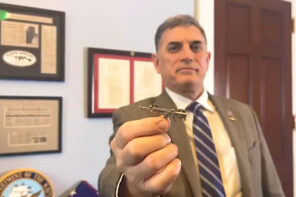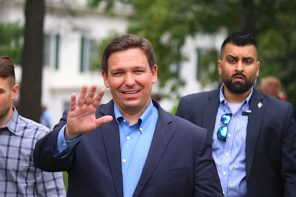For technical reasons (damn you, Adobe Flash!) I was limited to monitoring the progress of the Congressional Democrats’ sit-in last night mostly by Twitter. Still, what I saw was fascinating, and frankly, inspiring. It’s hard not to admire a 76-year-old John Lewis using the same tactics he used in the campaign against segregation for a new kind of liberation. We’ll come back to his determination later.
First, to answer your questions:
Was the sit-in a publicity stunt?
Yes, and a successful one at that. The Dems were able to put a spotlight on Republican inaction. The House GOP leadership played right into their hands by turning off the floor cameras, which made them seem anti-small-d-democratic, and by holding a vote to roll back consumer protections in the middle of the protest. Louie Gohmert screaming and pointing at his colleagues didn’t help much, either.
Doesn’t Democratic fundraising off the sit-in prove they weren’t serious?
No more than Republican fundraising off repealing the Affordable Care Act. The point here was to get political leverage. One way to do that is to raise ad money so they can show how Republicans have failed to take action. That’s why the sit-in ended after a day: it only took its organizers that long to accomplish their goals.
Wait, the protestors didn’t want to pass their bill?
There was never any chance that the bill—a measure to ban suspects on the federal terror watch list from buying guns—was going to become law. But a vote would have forced Republicans to go on record voting for gun rights over protection from terrorism, demonstrating their hypocrisy. In an already-dicey year for GOP incumbents, that would have been a very uncomfortable position.
Doesn’t this set a dangerous precedent?
It might, although Republicans staged a longer protest in favor of offshore drilling back in 2008. Beyond that, you’ll have to judge for yourself whether legislative gridlock or protests on the House floor are the bigger danger. It’s not too much to argue that a collapse in civic norms created this situation; it’s the only way Lewis and his allies could get a hearing.
That collapse also presented the Democrats with the opportunity to stage this protest. It’s a measure of what trouble the GOP is in this year that Dems decided they could get away with the sit-in. I don’t know if the Democrats think re-taking the House is within their reach, but it looks like they’ve decided every seat matters.
So you’re saying protests work?
This protest worked. It had a single, clear, and achievable objective and a point of leverage. Give us a vote on this bill, or we’ll embarrass you in front of the nation.
It’s important to say this on the one hand against the idea that Democrats should have fought for a better bill, or worked to “take the money out of politics” to limit the NRA’s effectiveness. Sometimes you have to play the short game so you can play the long game. A win here sets up better political conditions for more and better wins down the road.
It’s also important to note this against the notion that somehow having enough people speak up with moral clarity on an issue will make a difference, a line you often hear from what I’ve in the past called the “religion-industrial complex.” Those stacks of high-minded email petitions you see delivered to lawmakers’ offices pretty much go directly in the trash. They pay more attention to phone calls and letters, but street protests don’t bother them at all, unless they’re on cable news, which they almost never are. Hashtags? Changing your Twitter avatar? Forget about it.
Popular protest does play a supporting role in getting us to a point where something like the Congressional sit-in works. So do the organizations—including the religious groups—who sponsor it. There has to be an entire ecosystem to make change possible. But it’s very incremental. Don’t be fooled by the fundraising appeals that tell you “we’ve got the NRA on the run!” What will finally cause change, as I’ve often argued, is voting people out of office. That’s why the sit-in worked. Republicans are vulnerable this year, and they’re going to get hammered on gun control, among many other issues.
But yes, values do play a role in the gun control debate, among others. As it happens, John Lewis has a long history of working from religious principles, particularly in his commitment to non-violent strategies. Boy, is he ever committed. Charlie Pierce wrote the other day that
There are several retired members of the Alabama state patrol that can tell you that, when John Lewis sets his mind to something, he doesn’t much care what happens to him along the way.
That put me in mind of this upcoming Sunday’s gospel text. Jesus has his face “set on Jerusalem,” meaning he’s going to bring his message of forgiveness, healing, and liberation right into the heart of the power structure in his nation. When he’s ready to go, he’s ready to go. He tells his followers not to waste time fighting with the Samaritans who aren’t interested in his mission. Don’t get distracted, he says: keep your hands on the plow and don’t look back.
Now, I’m not going to compare John Lewis to Jesus—except in this regard. Sometimes what it takes to create change is a determined individual who knows what’s right and what’s wrong and is willing to focus on it single-mindedly. Have you ever heard a better description of John Lewis? I haven’t.




